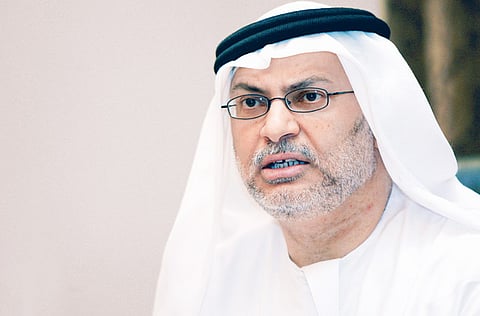UAE has zero tolerance against human trafficking, conference told
Human rights office officially opened at Dubai airport

Dubai:
The UAE’s efforts to combat human trafficking is a national duty and is not being done to garner attention or for publicity purposes, said a senior government official.
Dr Anwar Mohammad Gargash, Minister of State for Foreign Affairs, Minister of State for Federal National Council Affairs and Chairman of the National Committee to Combat Human Trafficking, said in a press conference on Thursday that the UAE’s efforts to combat human trafficking is not to satisfy the US government’s human rights report or to please any other human rights organisation in the world but is part of the UAE’s culture and tradition.
“We are working to combat human trafficking because it is part of our culture and tradition to overcome such kinds of issues,” said Dr Gargash.
He was talking during the launch of a drive to combat human trafficking under the slogan ‘Say No To Human Trafficking’, at Dubai International Airport in cooperation with Dubai Police.
The conference was attended by senior officials from Dubai Police and Dubai International Airport.
“Our campaign covers a comprehensive target audience comprising large segments of UAE citizens and residents as well as visitors to this country. It is for this reason that we thought of Dubai International Airport as the ideal location to launch this initiative, considering that it is one of the busiest airports in the world, having received as many as 57.6 million passengers in 2012,” said Dr Gargash.
“Travellers and users of Dubai airport are called to report to the police any foul play or any suspicious acts. People can visit the Dubai Police human rights office at Terminal 3 and 1 at the airport,” he said.
The Ministry of Interior and Dubai Police are intent on combating human trafficking, he said.
Dr Gargash said human trafficking is an international phenomena but in the UAE the issue mainly concerns sexual abuse against women.
“There are some labour cases here but regarding child trafficking the UAE has only come across two cases,” he added.
He said that there may be 30 or 40 cases of suspected trafficking a year but they may not always be classified as human trafficking because the case goes from the police to the public prosecutor and then to court where the judge will decide what kind of a case it is.
Community awareness
Dr Gargash said that community awareness is an important factor in combating such crimes, and therefore, the campaign launched by the Committee will strengthen the UAE’s position in global efforts to combat the menace of human trafficking.
He said that recently Shaikh Hamdan Bin Zayed Al Nahyan, the Ruler’s Representative in the Western Region, issued a resolution to establish a centre for adult male victims of human trafficking and sexual abuse.
He said on behalf of the National Committee for Combating Human Trafficking he would like to express his appreciation for the decision “which is consistent with the stand adopted by the UAE to fight human trafficking crimes, and reduce their impact on society through partnerships and agreements between competent authorities in the country.”
“The campaign against human trafficking highlights the significant role played by the UAE in raising the level of awareness among all segments of society about the threat posed by this criminal activity. It also confirms UAE’s determination to tackle these crimes through legislative and executive channels and international cooperation,” said Dr Gargash.
He urged the media to find innovative ways to convey information about the campaign.
“The media is a key partner for the committee in the campaign to raise awareness as well as other similar campaigns and future initiatives,” he added.
Dr Gargash said the UAE has taken major steps in combating human trafficking through the National Committee to Combat Human Trafficking following the amendment of Federal Law No 51, which has made it possible to better safeguard the victims of such crimes in accordance with the Palermo Protocol ratified by the UAE in 2009.
The campaign aims to create comprehensive awareness in society and develop partnerships between the public and private sector to unify national efforts in combating human trafficking.


